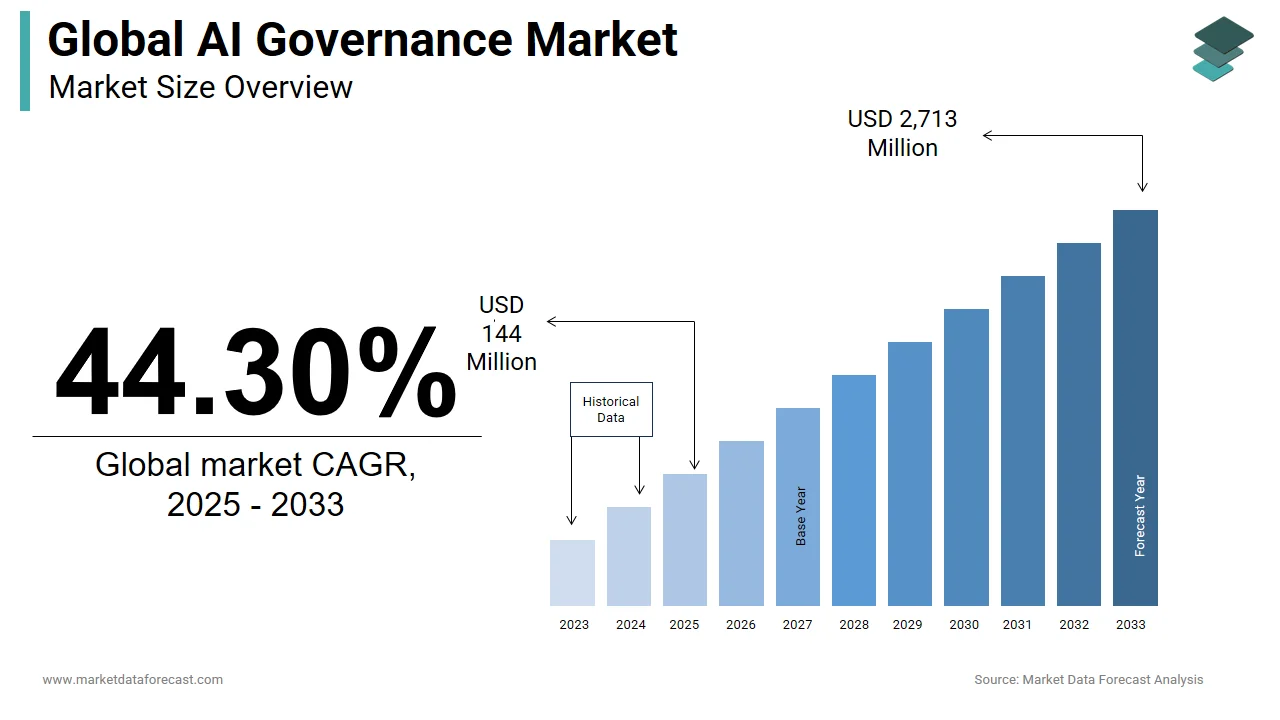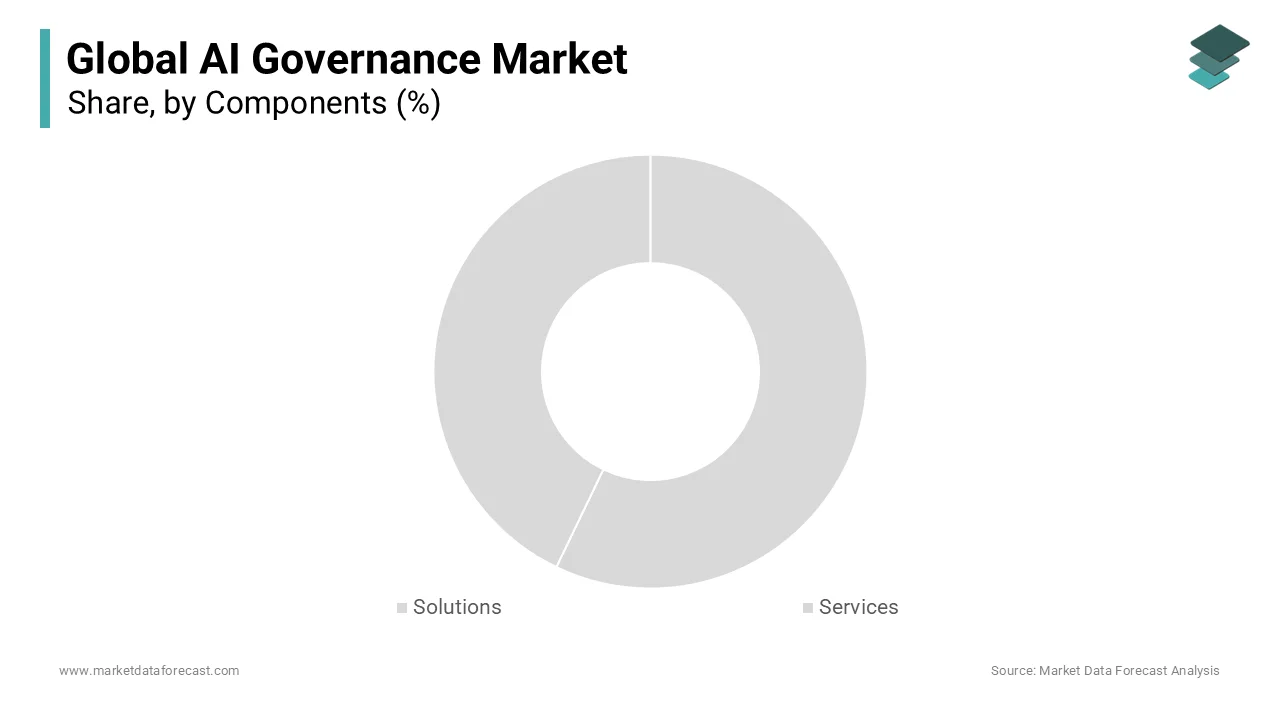Global AI Governance Market Size, Share, Trends, & Growth Forecast Report – Segmented By Component (Solutions and Services) Deployment Mode (Cloud and On-Premises) Vertical (BFSI, Government and Defense, Media and Entertainment, Healthcare and Life Sciences, Automotive, Telecom, Retail and Others) & Region - Industry Forecast From 2024 to 2032
Global AI Governance Market Size (2024 to 2032)
The global AI governance market was worth USD 70 million in 2023. The global market is expected to reach USD 100 million in 2024 and USD 1880 million by 2032, growing at a CAGR of 44.30% during the forecast period.

Artificial intelligence, or AI, is the buzzword of the present day. Increase government initiatives and measures for the optimal use of AI technology and to make AI systems more reliable. Additionally, there has been a growing demand for more transparency in decisions related to AI technology. These factors are likely to drive the growth of the global AI governance market. However, a better understanding of AI skills and data is needed to reap the benefits for years to come.
The AI governance process includes a framework and policies that aim to continuously develop, design, and monitor machine learning (ML) algorithms and models. This ensures that the results remain free from bias. The government should emphasize and focus on the responsible, transparent, and ethical use of AI systems.
As industries face the potential for breaking laws while working with the environment, adopting an AI governance solution minimizes the gap between responsibility and ethics in advanced technologies. The increasing adoption of AI across all industry verticals makes the adoption of AI governance necessary.
MARKET TRENDS
The services segment will grow at a higher CAGR during the forecast period
The services segment plays a vital role in the software lifecycle by implementing platforms and performing related activities. These services include consulting, integration, support, and maintenance, which are necessary to implement, run, and maintain AI governance solutions. They help build a strategic and operational plan to identify the most effective way to achieve business goals.
The automotive segment will grow at the highest rate during the forecast period.
Autonomous transportation is one of the areas of the automotive industry where AI governance solutions should play an important role because if an autonomous vehicle makes a mistake in decision making, it can directly lead to loss of life. Therefore, given that self-driving cars can play an important role in decision-making related to life or death, they are expected to become the primary adopters of the AI governance solution.
MARKET DRIVERS
Intensifying government efforts to harness the benefits of artificial intelligence technology is driving growth in this market. The growing need to build trust in artificial intelligence systems and the growing demand for transparency in artificial intelligence decisions also act as market drivers. Increasing compliance with technological regulations is driving the growth of this market. Reducing gender bias and discrimination through the use of artificial intelligence accelerates the growth of this market.
MARKET RESTRAINTS
Establishing comprehensive ethical principles for artificial intelligence limits the growth of this market. The high investment cost is holding back the growth of this market. Insufficient experience and skills in artificial intelligence are also a market limitation.
REPORT COVERAGE
|
REPORT METRIC |
DETAILS |
|
Market Size Available |
2023 to 2032 |
|
Base Year |
2023 |
|
Forecast Period |
2024 to 2032 |
|
CAGR |
44.3% |
|
Segments Covered |
By Component, Deployment, Vertical, and Region |
|
Various Analyses Covered |
Global, Regional & Country Level Analysis, Segment-Level Analysis, DROC, PESTLE Analysis, Porter’s Five Forces Analysis, Competitive Landscape, Analyst Overview on Investment Opportunities |
|
Regions Covered |
North America, Europe, APAC, Latin America, Middle East & Africa |
|
Market Leaders Profiled |
IBM Corporation, Google, Microsoft, Facebook, SAP SE, Salesforce.com, Inc., Fair Isaac Corporation, BoardBookit, Inc., Intel Corporation, NVIDIA Corporation, Anki, AIBrain Inc., Banjo, Apple Inc., Amazon.com, Inc., Appier Inc., SenseTime, Kindred, Inc., OrCam and Others. |
SEGMENTAL ANALYSIS
Global AI Governance Market Analysis By Components

The AI governance market is fragmented into solutions and services. The solutions segment is expected to see further growth in the future due to its critical role during the implementation of the software lifecycle. These services include advice, integration, maintenance, and support. They help build an operational and strategic plan to identify essential methods to achieve business objectives.
Global AI Governance Market Analysis By Deployment
the global market is mainly bifurcated into cloud and on-premises.
Global AI Governance Market Analysis By Vertical
The vertically divided AI governance market is divided into BFSI, Media and Entertainment, Government and Defense, Health and Life Sciences, Telecommunications, Retail, Automotive, and Others. Since autonomous cars will play an important role in decisions related to life or death, they are anticipated to become a major adopter of AI governance.
REGIONAL ANALYSIS

In the global AI governance market, North America is expected to have the largest volume, while Europe is expected to experience the fastest growth during the forecast period. In terms of implementing and improving AI governance strategies, North America should be the number one sector. Due to AI regulation, various innovations are taking place in the European region, so Europe is expected to grow faster in the coming years. The adoption of AI-based services will grow in the region due to the growing ethical issues in AI technologies and the growing need for a legal framework to ensure the development of the machine learning algorithm, thus stimulating the growth of the AI governance industry.
KEY PLAYERS IN THE GLOBAL AI GOVERNANCE MARKET
A few of the top competitors currently working in the global AI governance market are IBM Corporation, Google, Microsoft, Facebook, SAP SE, Salesforce.com, Inc., Fair Isaac Corporation, BoardBookit, Inc., Intel Corporation, NVIDIA Corporation, Anki, AIBrain Inc., Banjo, Apple Inc., Amazon.com, Inc., Appier Inc., SenseTime, Kindred, Inc., OrCam, among others.
RECENT HAPPENINGS IN THE GLOBAL AI GOVERNANCE MARKET
-
In January 2019, Facebook published its deal with the Technical University of Munich and its internal project, Fairness Flow, which comes with various tools that can produce metrics to determine whether or not there are unwanted metrics on specific models.
-
In August 2019, Microsoft announced the Digital Governance Tech Tour, which will help accelerate the digital initiative in India. The project includes a series of physical and virtual sessions and aims to train 5,000 employees over a 12-month period. This program includes the provision of artificial intelligence and intelligent cloud computing skills to government officials across the country.
-
In September 2018, IBM Corporation released AI Fairness 360 (AIF360), a comprehensive set of open-source tools for unwanted biases in data sets and cutting-edge algorithms and machine learning designs to mitigate these biases. This version of the AIF360 Python suite includes nine different algorithms created by the broader equity research community to mitigate this unwanted bias. The launch of this product helps the company attract researchers from around the world to use this set of tools.
DETAILED SEGMENTATION OF THE GLOBAL AI GOVERNANCE MARKET INCLUDED IN THIS REPORT
This research report on the global AI governance market has been segmented and sub-segmented based on the component, deployment, vertical, and region.
By Components
-
Solutions
-
Services
By Deployment
-
On-Premises
-
Cloud
By Vertical
-
BFSI
-
Government and Defense
-
Media and Entertainment
-
Healthcare and Life Sciences
-
Automotive
-
Telecommunication
-
Retail
By Region
-
North America
-
The United States
-
Canada
-
Rest of North America
-
-
Europe
-
The United Kingdom
-
Spain
-
Germany
-
Italy
-
France
-
Rest of Europe
-
-
The Asia Pacific
-
India
-
Japan
-
China
-
Australia
-
Singapore
-
Malaysia
-
South Korea
-
New Zealand
-
Southeast Asia
-
-
Latin America
-
Brazil
-
Argentina
-
Mexico
-
Rest of LATAM
-
-
The Middle East and Africa
-
Saudi Arabia
-
UAE
-
Lebanon
-
Jordan
-
Cyprus
-
Frequently Asked Questions
How are advancements in AI technologies influencing the evolution of AI governance practices worldwide?
Advancements in AI technologies, such as machine learning, natural language processing, and computer vision, are driving the need for more robust AI governance practices to address emerging challenges related to bias mitigation, algorithm explainability, and data privacy.
What are some of the key regulatory challenges impacting the AI governance market globally?
Key regulatory challenges in the AI governance market include the lack of standardized regulations across different regions, ambiguity in liability frameworks, and the need for comprehensive guidelines addressing AI ethics, transparency, and accountability.
What are some emerging trends in the global AI governance market that businesses should be aware of?
Emerging trends in the AI governance market include the adoption of AI ethics by design principles, the rise of AI governance-as-a-service solutions, the emergence of AI compliance management platforms, and the growing emphasis on stakeholder engagement and transparency.
What are the potential future challenges and opportunities for the global AI governance market?
Future challenges for the AI governance market include addressing the complexity of regulating rapidly evolving AI technologies, navigating geopolitical tensions surrounding AI governance, and ensuring global cooperation on AI standards and norms. However, these challenges also present opportunities for innovation, collaboration, and the development of scalable AI governance solutions to address emerging risks and opportunities in the AI ecosystem.
Related Reports
Access the study in MULTIPLE FORMATS
Purchase options starting from $ 2500
Didn’t find what you’re looking for?
TALK TO OUR ANALYST TEAM
Need something within your budget?
NO WORRIES! WE GOT YOU COVERED!
Call us on: +1 888 702 9696 (U.S Toll Free)
Write to us: [email protected]